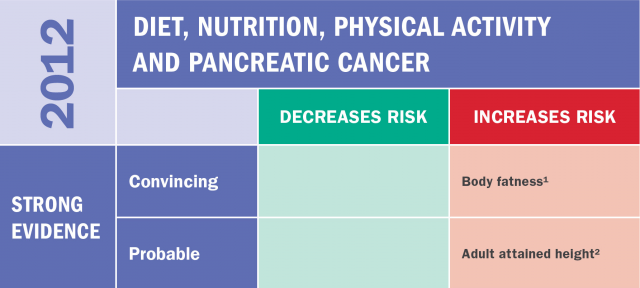Cancers of the pancreas account for about 2% of cancers overall. The early stages of this cancer do not usually produce symptoms, so the disease is generally advanced when it is diagnosed.
The pancreas is an elongated gland located behind the stomach. It contains two types of tissue, exocrine and endocrine. The exocrine pancreas produces digestive enzymes that are secreted into the small intestine. Cells in the endocrine pancreas produce hormones including insulin and glucagon, which influence glucose metabolism.
AICR’S latest report on pancreatic cancer found that maintaining a healthy weight can lower your risk. Tobacco use is also highly linked to higher risk for pancreatic cancer.
Lifestyle and pancreatic cancer risk.
- Weight
Excess body fatness puts you at greater risk for pancreatic cancer.
- There is convincing evidence that greater body fatness (as BMI) is a cause of pancreatic cancer.
- There is probable evidence that abdominal fatness (incorporating waist circumference and waist-to-hip ratio) is a cause of pancreatic cancer.
- Obesity influences the levels of a number of hormones and growth factors that may promote the growth of cancer cells.
- Obesity is characterized by a low-grade chronic inflammatory state. Such chronic inflammation can promote cancer development.
- Diet
There is some evidence that:
- consumption of red meat might increase the risk of pancreatic cancer.
- consumption of processed meat might increase the risk of pancreatic cancer.
- consumption of foods containing saturated fatty acids might increase the risk of pancreatic cancer.
- consumption of alcoholic drinks might increase the risk of pancreatic cancer.
- consumption of foods and beverages containing fructose might increase the risk of pancreatic cancer.
- Smoking
Tobacco use is an established cause of pancreatic cancer.
- Approximately 25% of cases of pancreatic cancer are attributable to tobacco smoking
- Adult-attained height
There is probable evidence that developmental factors leading to greater height may increase risk.

Foods that fight cancer.
No single food can protect you against cancer by itself. But research shows that a diet filled with a variety of vegetables, fruits, whole grains, beans and other plant foods helps lower risk for many cancers.
Cancer Updates
The science of survival.
AICR’s health guides and recommendations are developed from research that focuses on how nutrition and lifestyle affect the prevention, treatment, and survival of cancer. Paramount to our updates is the Continuous Update Project which helps you stay on top of new findings, and understand the data that sits at the center of our work.






